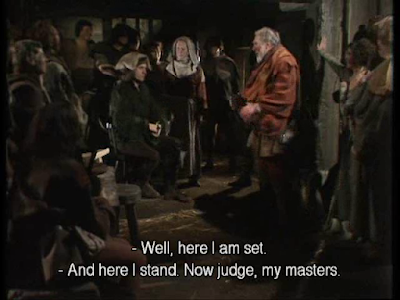- Possibly written: No later than 1597, possibly his 15th play
- What’s it about? In this sequel to Richard II, Henry IV quickly breaks his promise to go to the Holy Land, blaming rebellions at home. Meanwhile, his no good son Hal pals around with drunken robbers, including Falstaff. When Henry has to go to war with a rebel named Harry “Hotspur” Percy (Yes, there are three Harrys), Hal and Falstaff step up and join in the effort, winning the day.
- Most famous dialogue: Hard to say, either it’s “What is in that word ‘honour’? What is that honour? Air. A trim reckoning. Who hath it? He that died o’Wednesday.” Or it’s “The better part of valor is discretion.”
- Sources: As with all the Histories, it’s mostly drawn from Holinshed’s Chronicles.
- Interesting fact about the play: This was Shakespeare’s most popular printed text, with four editions released in his lifetime.
- Best insults:
- What a wasp-stung and impatient fool art thou to break into this woman’s mood
- None of your mad mustacio’d purple-hued malt-worms
- Out, you mad-headed ape! A weasel hath not such a deal of spleen as you are toss’d with
- There’s no more faith in thee than in a stewed prune
- Certainly Shakespeare’s longest insult: That trunk of humours, that bolting-hutch of beastliness, that swollen parcel of dropsies, that huge bombard of sack, that stuffed cloak-bag of guts, that roasted Manningtree ox with the pudding in his belly, that reverend vice, that gray iniquity, that father ruffian, that vanity in years
- Best word: So many! Can’t choose between Vizards, Corrival, Pismires, Paraquito, Sarcenet, and Enfeoff’d.
- Best production of this play I’ve seen: I’ve never seen it on stage. There have been several excellent adaptations, but I prefer this one, partially because it’s the only one that preserves the two parts. Orson Welles combines them and just uses the Falstaff scenes for Chimes at Midnight (the public domain VHS print I saw was so bad that it didn’t make much impression on me). The Hollow Crown, also combined parts 1 and 2 into one episode, and I had other issues with it, but Tom Hiddleston was excellent as Hal. My Own Private Idaho is an excellent modernization of the play.
- Notable Names in the BBC Adaptation: Jon Finch reprises the role of Henry IV from the BBC’s Richard II. Tim Pigott-Smith this time plays Hotspur. Anthony Quayle (Lawrence of Arabia) plays Falstaff.
- They’re all excellent. Finch, despite being the title character, doesn’t have much to do but continues his tightly coiled performance. David Gwillim as Hal already contains the elements he’ll need for both feckless Hal and brave Henry V in his complex characterization. Quayle evokes both great laughs and great pathos (as opposed to Simon Russell Beale in The Hollow Crown, who’s just a sad sack)
- Unfortunately, we’re back indoors for the rest of the series. Since the only two filmed outside were As You Like It and Henry VIII, that means we’ll never get any proper battle scenes, but of course they probably couldn’t have afforded that. Giles does the best he can with his stagey sets and things don’t feel too cramped. Of course, the real job of the director is getting great performances, and, in that, Giles might be the best director we’ve had. He also makes the wisest choice yet seen in this series of gong against the text, as well see below…
In the play’s best scene, Falstaff and Hal are engaged in their typical baudy fun in an inn when they decide to pretend that King Henry has arrived to judge them. At first, Falstaff puts a cushion on his head and pretends to be the king, chiding Hal for his wicked ways but praising his friend Falstaff. Then Hal insists they switch places. When Hal plays the king, he is much harsher in his judgement of Falstaff, but it all still seems to be a rich jest on both their parts.
If you just stick to Shakespeare’s text (Remember, Shakespeare never wrote anything but dialogue) you could play the scene in such a way that the mood stays light both ways. But Giles, Gwillim and Quayle are up to a whole lot more here. The entire play, indeed the entire Henriad, is played out in this scene, as, when Hal-as-the-king is lambasting Fastaff, his jibes get a bit too pointed and the laughter of the room slowly dies away. Gwillim still maintains just enough mirth in his voice to play it off as a joke, but he’s clearly rehearsing for his actual turn against Falstaff, and Falstaff, sensing this, begins to seriously try to defend himself, though he has to pretend that he’s only pretending to do so. Finally, Falstaff ends by protesting: “banish plump Jack, and banish all the world.” Hal responds, “I do, I will.” This could have been played in jest, but Gwillim is 10% joking and 90% ice-cold. Just then, the king’s men actually burst upon them and Hal is truly called to face his father.
Things aren’t over between Hal and Falstaff in this play, and there’s still a sequel play to come, but this one scene, though seemingly written as a merry jest, has been played by the director and the actors in such a way as to convey so much more. It’s a brilliant piece of directing and acting and shows how Shakespeare’s rich texts can be twisted into all sorts of new shapes, which is one reason he has remained so popular.


No comments:
Post a Comment